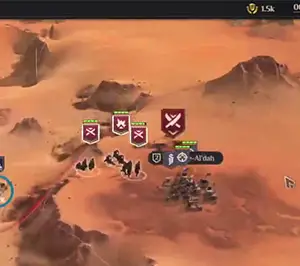Dune Spice Wars is an early access game developed by Shiro Games and Published by Funcom and Shiro Games. It’s a pausable RTS strategy game set in the fictional world of Arrakis. In this game you lead one of the four factions to power and greatness.
Dune Spice Wars is a definite buy in my opinion, even in its early access state. It pulls you into the game right away and hours are gone before you know it. Combat is simple and effective, and since this is a strategy game you usually can’t expect too much in the tactics department. I truly enjoy this game and would buy it again.
This is an early access game so my criticisms will be few. I think the tutorial could be a lot better, it barely walks you through the start of the game, but I found the game easy to learn after a few playthroughs.
Dune Spice Wars Factions
Dune Spice Wars has four playable factions, House Atreides, House Harkonnen, The Smugglers and the The Fremen.
House Atreides is the “nice” faction of the group. They can annex villages peacefully rather than marching their military in and taking over forcefully. Typically, when factions make treaties with each other they lose some Authority, which is needed to take control of Villages, but when someone enters into a treaty with House Atreides no Authority is lost.
House Harkonnen is the opposite of the House Atreides. They’re the militaristic faction of the group and the nastiest. They can oppress their villages to force more output, at the expense of a possible rebellion later. They also gain 5% in a village’s production for each Militia they have stationed there. Through their vast contacts on the planet Arrakais they know how much Influence each faction has and where it comes from.
The Smugglers are just that, smugglers, but hope to someday become a part of the Landsraad Council. They have the ability to build Underworld Headquarters right underneath your villages. They can place bounties on Landsaard resolutions and have a favored trade status with the Black Markets on Arrakis.
The Fremen are the planet’s native population. By knowing their planet so well they are better able to live off the land, meaning their military units use less supplies per day. They can form alliances with Sietch’s outside of their territory and can actually learn to ride the sandworms, giving them the ability to move much faster through the deserts than the other factions.
Game Set Up
Game set up is simple and straightforward in Dune Spice Wars. Simply choose the faction you want to play, then select two of the four councilors available to help you run your empire. Each one has advantages, like Rabban Harkonnen of House Harkonnen. He provides an extra Militia slot in your villages, and he allows you to oppress your villages 5% longer than you normally would.
After that, you can select the game options. At that screen you can set the map size, Sandworm and Storm activity, how hostile the Sietch are and Victory Conditions (there are three but one, the Domination Victory, cannot be disabled).
You can also select with factions you want to play against and how difficult the AI is, anywhere from Easy to Insane.
Dune Spice Wars Development (Research)
There are four branches of Development in Dune Spice Wars, which is equivalent to Research in other games. One branch focuses on Intelligence/Diplomacy, the second one generalizes on game specific areas and is a general mix of things, another focuses on the economy and buildings, while the last one focuses on military advancements.
I’ll call one of the branched “Generalized” for lack of a better term for it. It has Local Districts at the start, which helps out with the Authority costs of annexing a village. It also has things like local hubs, which increase knowledge and resources gained from villages and Water Sellers Contracts that reduce the water upkeep on villages and military units.
Each faction also has one specialized item in each branch that replaces one of the options in each Development branch.
Dune Spice Wars Resources

Spice is the primary resource in Dune and it’s mostly what all the fighting is all about. Spice is “the most precious substance in the universe” so it’s understandable that’s there’s a lot of fuss about it. Every major power in the galaxy is interested in it, some noble and some not so noble. Spice can be converted into the game currency of Solari, usually at a favorable rate. When the game first starts the exchange rate is commonly two units of Solari received for every unit of Spice traded but the exchange rate fluctuates as the game progresses.
The game currency is Solari. It’s used to both purchase and maintain military units and buildings. There are rare elements available that give a significant boost to Solari production and maintenance buildings that can provide a reduction in some of the costs for maintaining buildings in your faction. This helps your Solari go a little bit farther.
Plascrete is a special material created to be able to stand up to the tough conditions on Arrakis. Lightweight bur versatile, it’s used in both the construction and maintenance of buildings.
Manpower is what fuels armies and military hardware. Without enough manpower you can’t grow your military and defend yourself from both raiders and other factions, let alone expand forcefully if needed. Manpower if needed for both your armies and for staffing military vehicles and installations.
Fuel Cells are the main source of power on the planet. Without an adequate supply of them you won’t have enough power available to operate vehicles or even be able to build certain buildings, like refineries which harvest the Spice you so desperately need.
Water is vastly important on the desert world of Arrakis. It’s used to both keep armies going as well as villages. Running short of water can lead to unrest in your population and even outright rebellion.
Authority is a measure of your faction’s leadership. The more of it you have the more Villages you can take control of. Without enough of it you can’t control a Village, no matter how powerful your military is.
Knowledge is used to research new developments, the more you have the faster the progress.
Influence is primarily used for helping out with votes in the Landsraad Council, you can add it to the votes you cast. Influence is especially important for the House Atreides since it’s also used as part of the cost for Peaceful Annexation of a village. For them, use of Influence in the Council versus Peaceful Annexation is a delicate balancing act.
Hegemony is a measure of how powerful your faction is on Dune, the higher the number the more powerful you are. Reaching certain levels of Hegemony unlocks benefits, some of which are specific to the faction you’re playing. Things that increase this are pillaging villages (can’t be done if you’re the House Atreides), the number of controlled regions, spice taxes paid, and the number of enemy units you’ve defeated.
If you’re House Atreides or House Harkonnen you’ll also have Landsraad Standing. This is how much political clout your faction has and makes it easier to get Resolutions passed that you like, provided you have a high enough standing.
Dune Spice Wars Military Units
Each faction starts with five basic Military units. Surprisingly, at least to me, is that the Smugglers have the most powerful units offensively, but their lack of armor makes up for their superior strength. Their most powerful unit is the Free company. It has 20 attack points but only 4 points of armor. They can definitely pack a punch but can’t stay in the fight for very long.
Each faction has a version of a melee unit, a more powerful melee unit costing more, and ranged units.
Dune Spice Wars Combat

Combat is simple and at the start of the game you’re limited to five basic types and at first you can only field two units . Each faction has variations in how it fights. For example, House Atreides gets a combat bonus for jumping on one enemy unit at the same time.
It’s a simple point and click to initiate a fight but you do need to pay attention to your unit’s supplies. When they run out, they will quickly take attrition and die unless you get them back into your territory in time.
User Interface
The User Interface is well laid out and makes good use of the edges of the screen. At the left side is a pop-up icon giving you hints about the game and later objectives to accomplish that can be beneficial. The top of the screen contains most of the resources I previously mentioned plus it has a slider for controlling how much of your Spice production is placed in a stockpile versus how much of it you trade on the market.
On the right edge is a panel you use to access the Developments, Council and Espionage activities of your empire. You also use this panel to build military units like Ornithopters, which are primarily used for exploration.
Dune Spice Wars Gameplay
The initial phase of the game for each faction starts out the same, send an Ornithopter to explore the Spice field that is already identified, locate the Village in its region and annex it, then start harvesting Spice.
After that it’s up to you what happens next. I usually build a few military units and a second Ornithopter at the very start, and then start annexing everything I can. While this might be a viable option in more skillful hands, it has always led to disastrous results for me.
This is a game that’s not super deep in strategy but a lot of times that’s a welcome change from a complex game like Stellaris.
Dune Spice Wars Dislikes
What do I dislike about this game? After all, every game has them. Since this is an early access game there are bound to be a few, but in early access that’s okay since lots of bugs and features are still being worked out.
One thing I didn’t like too much was the game options icon next to the Start Game button. It is grayed out and unidentified, making it very easy to either overlook or ignore since the grayed out look usually means it’s an item that is unavailable. For the first few games I played I didn’t know what the victory conditions were and didn’t think there were any difficulty settings available.
My only other serious dislike is the tutorial. As it is right now it is very short and doesn’t go into enough detail for someone like me who is new to the Dune universe. It could definitely do a better job explaining what the Landsraasd Council is and how the Espionage system works.
Would I Buy This Again?
The answer to that is a definite yes. Even in its early access state the game is well worth the money. For a game in this price range, I’m getting everything I expected (good strategy, good graphics, great sound track).
Don’t forget to visit my YouTube channel at https://www.youtube.com/channel/UCcWU6qxVisK93h5guKRVtdg
The most important thing of all, at least to me, is am I getting the same amount of enjoyment or more, if I spend the equivalent amount of money out doing something entertaining, like going to a good movie. In other words, is it fun? For this game that answer is a resounding yes!
